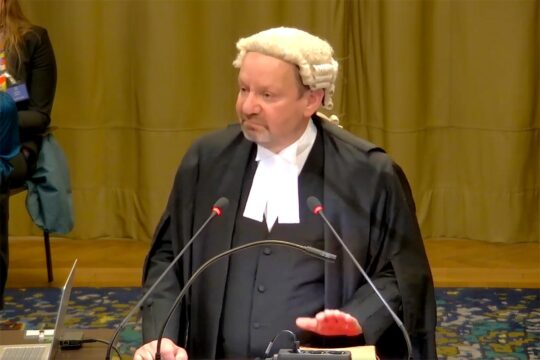Israeli security forces Friday killed two Palestinians and critically wounded a third after the men had opened fire on a base in the occupied West Bank, the latest flareup in violence after clashes in east Jerusalem.
The exchange of fire at the Salem base outside the northern West Bank town of Jenin came as tensions soar in annexed east Jerusalem over an eviction threat hanging over four Palestinian families.
"Three terrorists fired towards the Salem border police base," a statement from the border police said, adding that two of the attackers were shot dead, while the third was taken to hospital in Israel in a "critical condition".
Guns, knives and a large supply of ammunition were found on the men, police said.
The Palestinian health ministry said they had "no official information about the identity of the two martyrs".
The unrest came on Al-Quds Day -- using the Arabic word for Jerusalem -- an annual day of pro-Palestinian rallies held by Iran, the arch-enemy of Israel.
Iran's supreme leader Ayatollah Ali Khamenei on Friday called Israel "not a country, but a terrorist base", and in a televised speech said that fighting the Jewish state was "everyone's duty".
- Jerusalem clashes -
Friday's killings follow days of clashes and shootings.
On Sunday, a 19-year-old Israeli was fatally wounded in a drive-by shooting at the Tapuah junction bus stop, also in the northern West Bank.
Israeli security forces later announced they had arrested Montasser Shalabi, 44, in the village of Silwad near Ramallah, on suspicion of carrying out the attack.
Palestinian sources said Shalabi is a dual US national.
Israel's Shin Bet internal security agency said Shalabi was not known to belong to any Palestinian militant group.
After the man's arrest, Prime Minister Benjamin Netanyahu praised the security forces for their rapid "capture of the despicable terrorist", vowing that "Israel's long arm will reach anyone who harms our citizens."
On Wednesday, Israeli troops killed a 16-year-old Palestinian when they opened fire on protesters throwing petrol bombs.
The funerals of both youngsters were held on Thursday.
In east Jerusalem, the Sheikh Jarrah neighbourhood near the walled Old City has seen recent clashes between police and protesters, fuelled by a years-long land dispute between Palestinian refugees and Jewish settlers.
Police said they made 15 arrests late Thursday and 11 the previous night. The Red Crescent said 22 Palestinians were injured in the Wednesday night clashes.
The violence came as Palestinian Muslims flocked to the Al-Aqsa mosque compound in east Jerusalem for the last Friday prayers of the holy fasting month of Ramadan.
Police said protesters torched a vehicle and threw stones outside a house occupied by Jewish settlers.
Palestinians also traded insults with far-right Israeli lawmaker Itamar Ben-Gvir, who visited Sheikh Jarrah to voice support for the settlers.
By Friday afternoon, hundreds of protesters returned to the site, where Israeli police fired tear gas.
- Possible 'war crime' -
In neighbouring Jordan -- home to a large Palestinian population -- hundreds joined a Palestinian solidarity rally in the capital Amman, chanting "we will die for Sheikh Jarrah".
The United Nations called on Israel Friday to end any forced evictions in Israeli-annexed east Jerusalem, warning that its actions could amount to "war crimes".
"We call on Israel to immediately call off all forced evictions," UN rights office spokesman Rupert Colville told reporters, adding that east Jerusalem was "part of the occupied Palestinian territory, in which international humanitarian law applies".
"The occupying power... cannot confiscate private property in occupied territory," he said, adding that transferring civilian populations into occupied territory was illegal under international law and "may amount to war crimes".
Earlier this year, a Jerusalem district court ruled four Palestinian homes in Sheikh Jarrah legally belonged to Jewish families, citing purchases made when the whole of historic Palestine, including what is now Israel, was under British rule.
The Jewish plaintiffs claimed their families lost the land during the war that accompanied Israel's creation in 1948, a conflict that also saw hundreds of thousands of Palestinians displaced from their homes.
Israeli law allows Jews who can prove pre-1948 title to recover their properties. It does not afford the same right to Palestinians.
The Sheikh Jarrah families have provided evidence that their homes were acquired from Jordanian authorities, who controlled east Jerusalem from 1948 to 1967.
Israel seized east Jerusalem in 1967 and later annexed it, in a move not recognised by most of the international community.
The district court ruling infuriated Palestinians in Sheikh Jarrah, who viewed it as a further step in what they see as a Jewish settler effort to drive Arabs out of east Jerusalem.
Israel's Supreme Court is to hold a new hearing in the case on Monday.
mibb-cgo/dac/pjm/fz


